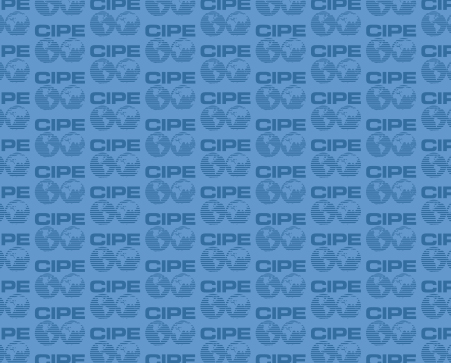One of the first people to walk through the doors after CIPE’s founding in 1983 was Hernando de Soto, President of the Institute for Liberty and Democracy (ILD) in Lima, Peru. Mr. de Soto had the fundamental insight that poor people were not part of the development problem but instead part of the solution. In his best-selling books, The Other Path and The Mystery of Capital, he explained how the lack of access to property rights and other institutions of a market economy keeps the poor in most developing countries trapped in the informal sector.
In one of its first-ever programs, CIPE teamed up with de Soto and ILD to begin bringing the poor in Peru from the extralegal economy into the formal economy and the rule of law. As a result of ILD’s unique and innovative property rights and business reform program, Peruvian society received $18.4 billion in net benefits between 1992 and 1997, including saving formalized urban owners some $196 million in red tape costs.
For the past twenty years, successive Peruvian governments have supported the basic concepts behind ILD’s program and have implemented important reforms that, combined with record commodity prices, have produced exceptional economic results. No Latin American or Caribbean economy grew more than Peru’s from 2000 to 2011, when it experienced average annual GDP growth of 5.75 percent.
Yesterday, Hernando de Soto once again walked through the front door of CIPE’s office in Washington D.C. to share with CIPE staff the history and progress of ILD’s work in Peru, as well as how ILD is using the lessons it learned in Peru to help shape the reform process in the Middle East and North Africa (MENA) following the Arab Spring.
As Mr. de Soto explained in his comments, the origins of the massive social movements in Egypt, Tunisia, Libya, and Algeria were economic in nature. Several previous articles on this blog – here and here – have laid out de Soto’s case, and in another recent post Molly Brister succinctly presents some of ILD’s research into the causes of the Arab Spring. ILD has spent the last two years researching the issue and raising awareness of the Arab Spring’s economic underpinnings; and it’s starting to pay off. ILD is now advising policymakers and civil society groups around the MENA region on the reforms necessary to strengthen each country’s entrepreneurial ecosystem.
Efforts to reform the economic and political systems throughout the Middle East and North Africa will take many years, and results may not be immediate. But just as they did in Peru in the late 1980s and early 1990s, Hernando de Soto and ILD have identified the lack of property rights, access to capital, and fair treatment under the law as the root causes of turmoil in the region. ILD’s work in Peru and in emerging markets around the world illustrates that inclusive markets require making the poor part of a democratic process, and that open participation in both markets and policy dialogue are a foundation of democratic governance. With any luck, the lessons from Peru will be paying huge dividends for MENA countries in the years to come.
If you want to learn more about Hernando de Soto and ILD’s work, don’t miss CIPE’s international conference April 9-10 in Chicago on Democracy that Delivers for Entrepreneurs where de Soto will be a keynote speaker. Over the course of the two day conference, speakers and participants will explore in depth the issues of entrepreneurship ecosystems and links between democratic and economic reforms.
Brent Ruth is CIPE’s Program Officer for Latin America and the Caribbean
Published Date: February 12, 2013
